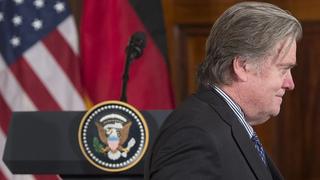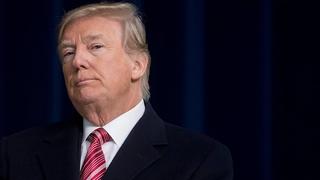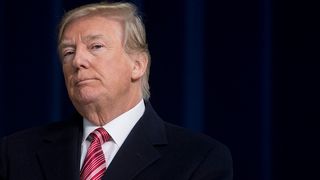Paul Keating once labelled a curmudgeonly Canberra observer as “a vacuum cleaner for corridor gossip”. Donald Trump would have been well advised to apply this kind of casual dismissal to Michael Wolff’s lacerating account of the first year of the Trump presidency, Fire and Fury: Inside the Trump White House.
For Wolff’s book was always destined to sell well, given both its subject matter and his breezy, insider style. But the astonishing over-reaction of the Trump White House to the book’s publication has guaranteed its arrival at the No 1 spot on the bestseller lists. After all, how many other presidents of the US have responded to a critical book by declaring themselves “a stable genius”?
For Trump loyalists, Wolff’s toxic publication can simply be dismissed as fake news: proof that the Washington establishment has not accepted the result of the 2016 election.
Certainly, there are many thoroughly disturbing suggestions and speculations in Wolff’s book, varying from cuckolding husbands to humiliate them through to an ignorance of the US Constitution and the republic’s foreign relations that would be staggering, if accurate.
For the anti-Trumpers these are simply confirming observations: a narcissistic boor occupies the Oval Office.
For Trump loyalists, Wolff’s toxic publication can simply be dismissed as fake news: proof that the Washington establishment has not accepted the result of the 2016 election.
The foundations of Fire and Fury are to be found in Trump’s now deposed and disgraced White House strategist Steve Bannon. While others within the administration may well have contributed, Bannon is central to assessments of a White House that is clearly dysfunctional and often chaotic, riven by rivalries both ideological and personal, and characterised by erratic decision-making.
The starting point for Wolff’s book is the assertion that the Trump camp and the candidate himself, did not want to win or believe he could win the White House. This assertion, now under sustained challenge, develops thus:
Winning presidential candidates — driven by hubris or narcissism or a preternatural sense of destiny — have, more than likely spent a substantial part of their careers, if not their lives from adolescence, preparing for the role ... The Trump calculation, quite a conscious one, was different. The candidate and his top lieutenants believed they could get all the benefits of almost becoming president without having to change their behaviour or their fundamental worldview one whit: we don’t have to be anything but who and what we are, because of course we won’t win.

If so, the Trump campaign was reading the 2016 polls the same way as most other participants and observers. And indeed, on election night some Trump campaigners conceded defeat early on. But, contrary to expectations. Trump won in one of the biggest political upheavals since Andrew Jackson won in 1828.
Jackson’s supporters believed their candidate had been cheated by the political establishment four years earlier and reacted demonstratively on Inauguration Day in 1829. As HW Brands writes in his biography, Andrew Jackson: His Life and Times, “The mob scene at the White House was what most people remembered about the inauguration. Even some Jacksonians were taken aback.”
“It was a glorious day yesterday for the sovereigns,” James Hamilton wrote wryly. “The mob broke in, in thousands. Spirits black, yellow, and grey, poured in one uninterrupted stream of mud and filth, among the throng many subjects for the penitentiary.”
Certain elements of the Trump constituency, reflected in his boisterous rallies, bear a resemblance to the Jacksonian Democratic rank and file. And note that President Trump has a portrait of “Old Hickory” over his shoulder for photographs in the Oval Office.
The loathing of political elites — both Republican and Democrat — is part of what drives Trump’s support. And he is only too well aware that his supporters voted, in part, against Hillary Clinton as much as for him.
As Rush Limbaugh has observed, Trump knows his base, and this is why the Clinton name must still feature in tweets and threats of investigation.
The truth is, Bannon was always well above his pay grade, believing apparently that he would one day run for president. The best illustration of this hubris is perhaps Bannon’s endorsement of the appalling Roy Moore Jr in last month’s Alabama Senate race.
Bannon claimed to have saved the Trump campaign in 2016 in the wake of the “locker-room” talk on the Billy Bush tapes. The unprepossessing Bannon, patronised by the billionaire Mercer family — father Robert and daughter Rebekah — had emerged from the Breitbart media stable, a niche conservative news platform that attracted much interest from characters in the “alt-right” of American politics. Elevated to a senior White House role, Bannon saw himself defending “Trumpism” (undefined) in clashes with New York “liberals” Jared Kushner and Ivanka Trump (dubbed Jarvanka) and railing against stupidities such as the firing of FBI director James Comey.
Enter the Russians: co-operative and smiling. Bannon’s fall from grace centres on his blistering criticism of the questionable meeting in Trump Tower in June 2016 between senior Trump campaigners and Russian representatives claiming to have dirt on Clinton. In particular, Bannon blasted the Trump family.
The truth is, Bannon was always well above his pay grade, believing apparently that he would one day run for president. The best illustration of this hubris is perhaps Bannon’s endorsement of the appalling Roy Moore Jr in last month’s Alabama Senate race.
But the clearest illustration of Bannon’s unhinged, ideological approach was his suggestion a few days after the Trump victory that there were enough Republican votes in the US House of Representatives to replace Speaker Paul Ryan with the leader of the Congressional Freedom Caucus, Mark Meadows. This went nowhere even with the president-elect.
Bannon did not simply fly too close to the sun. He flew into it. Bannon is now politically crippled, if not neutered, and will never be recalled among influential presidential advisers such as Edward “Colonel” House, Harry Hopkins, Sherman Adams or James Baker.
In a summer when presidential biographers of Richard Nixon (John A. Farrell); Franklin D. Roosevelt (Robert Dallek); Ulysses Grant (Ron Chernow) and Herbert Hoover (Kenneth Whyte) offer both insight and understanding of US presidential power, what does Wolff offer?

Fire and Fury is very readable and entertaining and will provide much satisfaction in Georgetown dinner conversations. It does afford a window into presidential unpredictability, as when a press conference on America’s opioid addiction is suddenly transformed by a presidential denunciation of North Korea (“Fire and fury!”). Not much else emerges beyond internal games and indiscipline despite the best efforts of chief-of-staff John Kelly.
There is, however, a revolving cast of intriguing characters, from the self-effacing Veep, Mike Pence (derided by the Bannon camp as the Ozzie Nelson of the administration) through to the absurdly self-promoting Anthony Scaramucci. In this Wolff treads the theatrical boards previously traversed by Mark Leibovich in his gossipy Washington missive, This Town.
The way Trump is best understood, a Washington insider remarked recently, is to see him as craving respect. This is quite possible but cannot explain why he is so exercised by satirical sketches on Saturday Night Live.
An Australian diplomat visiting George W. Bush last year politely asked how the 43rd president viewed the 45th. Supposedly Bush responded with a laugh: “He’s great. He makes me look like George Washington.” Not much respect to be found there. Nor in the words of respected Republican senator Bob Corker, Tennessee), who has described the Trump White House as an “adult daycare centre”.
Wolff has been inside the White House door but his book is rather like a London tabloid journalist writing about the royal family. The real wolf is actually right outside the door of the Oval Office now in the formidable person of Robert Swan Mueller III.
Fire and Fury: Inside the Trump White House
By Michael Wolff, Little Brown, 321pp






